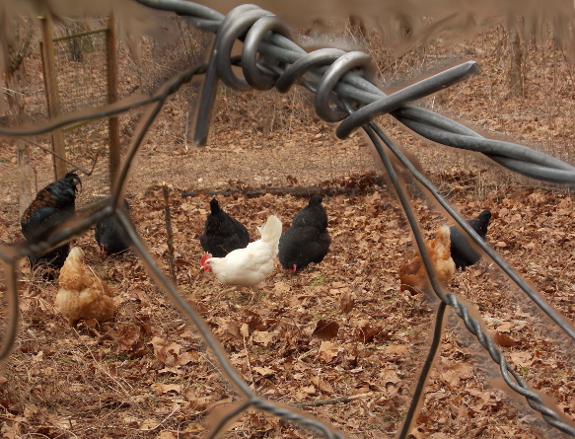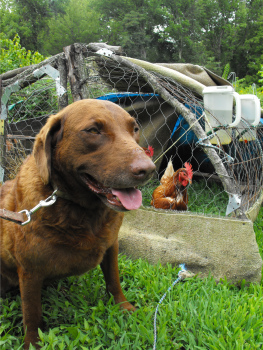
How to protect chickens from hawks, raccoons, and more

As you may have noticed,
I've been running a bit of an ongoing series here with answers to
questions new chicken-keepers might have. Previous posts included how to hatch homegrown chicks and how to choose the best chicken breeds for homesteaders.
Today I want to touch on a topic that's not so photogenic, but that
needs to be considered by anyone who wants to get into chickens --- how
to protect those delicious morsels from the wild animals who'd love
nothing more than to eat them up.
Baby chicks are most likely to be eaten by rats and snakes, but adult hens tend to succumb to dogs, hawks, raccoons, opossums, and similar predators.
Your first line of defense against predators is to protect your flock
when they're most vulnerable --- at night. A solid chicken coop is
optimal, and if your predator pressure is high you'll want to shut the
birds in each evening (or to invest in an automatic chicken door
to do the job for you). Raccoons, especially, can reach right
through small holes, so be sure your birds' roost is far enough away
from gaps so that a predator can't rip their heads off without even
entering the  hen
house. To be truly predator proof, the coop will also need to
have a solid base that extends for several inches into the soil to
prevent diggers from entering the coop. Finally, even though I
love giving scraps to chickens, I'm starting to lean away from putting
those kitchen scraps in the coop since the scent attracts predators who
stick around to eat my birds.
hen
house. To be truly predator proof, the coop will also need to
have a solid base that extends for several inches into the soil to
prevent diggers from entering the coop. Finally, even though I
love giving scraps to chickens, I'm starting to lean away from putting
those kitchen scraps in the coop since the scent attracts predators who
stick around to eat my birds.
What if your chickens are
getting picked off in the daytime instead? If you have a small
run (which you shouldn't), you can beef up the walls just like you did
the coop, then can string fishing line over the top in a woven pattern
to keep out hawks and owls. But if you prefer giving your birds
larger pastures, or even letting them free range, it's going to be
nearly impossible to keep predators out of their daytime living
area. Instead, I recommend adding a rooster to your flock, since
he'll sound the alarm and do his best to fight off any invader during
daytime hours. A good dog (trained to protect, rather than eat, chickens)
is the second line of defense --- our dog comes running as soon as she
hears our rooster's alarm call, and she has managed to chase away a hawk
that had pinned a hen three times over the past winter.
 Chickens
are pretty alert to predators during the daytime, with hawks being
their primary downfall. After a rooster and a dog, I have two more
lines of defense against raptors. First, I make sure that our
chickens roam in areas with lots of bushes and other things to hide
under. Hens often see a hawk coming as the raptor dives down to
dine, so if they have something to scurry beneath, the chickens might be
able to evade capture. Second, I raise dark-colored chickens,
since I've learned the hard way with multiple breeds over multiple years
that letting white chickens free range is like putting up a flashing
neon sign: "Chicken take-out, now hot!"
Chickens
are pretty alert to predators during the daytime, with hawks being
their primary downfall. After a rooster and a dog, I have two more
lines of defense against raptors. First, I make sure that our
chickens roam in areas with lots of bushes and other things to hide
under. Hens often see a hawk coming as the raptor dives down to
dine, so if they have something to scurry beneath, the chickens might be
able to evade capture. Second, I raise dark-colored chickens,
since I've learned the hard way with multiple breeds over multiple years
that letting white chickens free range is like putting up a flashing
neon sign: "Chicken take-out, now hot!"
I'd be curious to hear
from others who have dealt with their own predator problems. Which
predators are the most likely to eat your chickens? What do you
do to protect the flock?
And for those of you in the planning stages of starting your own chicken operation, be sure to check out our chicken waterers, which keep you from having to handle manure and keep your birds from having to drink it.
Want more in-depth information? Browse through our books.
Or explore more posts by date or by subject.
About us: Anna Hess and Mark Hamilton spent over a decade living self-sufficiently in the mountains of Virginia before moving north to start over from scratch in the foothills of Ohio. They've experimented with permaculture, no-till gardening, trailersteading, home-based microbusinesses and much more, writing about their adventures in both blogs and books.
Want to be notified when new comments are posted on this page? Click on the RSS button after you add a comment to subscribe to the comment feed, or simply check the box beside "email replies to me" while writing your comment.

Our big problem is definitely, certainly, and almost entirely mink. We're surrounded by lakes and rivers and mink are to be expected. That being said, we wouldn't mind it if it were wild (brown) mink.
There are several large black mink farms (read as 100,000+ mink) in the next county, on the same river system. They have strict no catch policies on mink that have escaped as they don't want to introduce parasites or disease from the wild.
Escapees make it down the river and take up a hunting ground. Unfortunately, as soon as one gets trapped or shot another takes its territory. We've lost over a dozen at a time during the peak breeding season, and a neighbor has lost and given up on rabbits. (he does have a shed full of nice pelts though)
Coops need to be mouse tight and full of perches and they must be locked in at night. Creating false entrances under the coop with traps also helps a bit. It's disheartening to lose your animals, really.
Free ranging just does not work for us, I'm sad to say. We have a neighborhood bob cat that comes and gets them during the daytime. Hawks fly overhead sometimes but since we're in a wooded place, they don't attack.
The other thing is to really, really make sure your coop is secure. We had a raccoon climb under the coop and pull a chicken's leg through the wire. So we had to totally board the bottom up. Then we had something rip through the chicken wire of the little window and pull a chicken up by the head (still can't figure out how it did it). Then we had a bear rip a board off to try to get to the chickens or the little bit of food I had in there. We had coyotes or dogs dig under the wood of a chicken tractor to get all the young roosters inside and then we had a bear flip over a chicken tractor to eat the meat chickens. It's been crazy. Our dog helps somewhat but we don't like to keep him outside at night because of the coyotes (and because he's more of a pet than a working dog).
Get an electric fencer! I have found that predators are all very easily trained to stay away from chickens by using an electric fencer. Pretty quickly, the predators know that chickens are dangerous things! and they don't want any part of 'em. I set up a fence around my small night-time coop. One wire is about 'nose high' to a cat, the second wire is 'nose high' to a dog. These two wires get about anything that wants to try chicken for dinner. I use a battery powered fencer. I connect it only at night when I shut the chickens in. It really works, and after a few weeks of 'training' the predator pressure drops to almost zero.